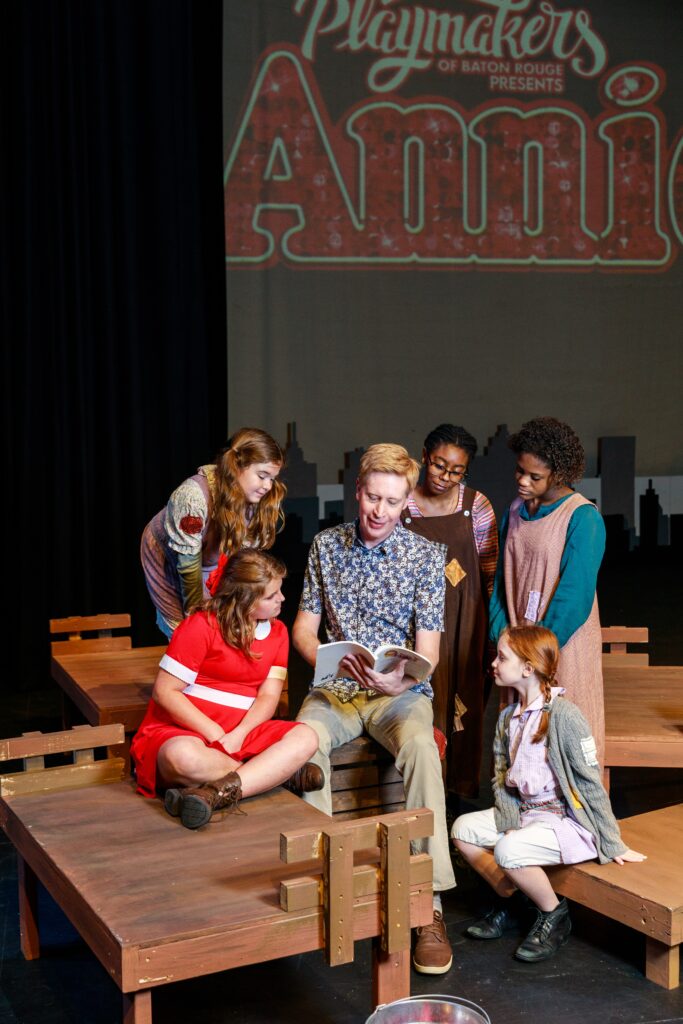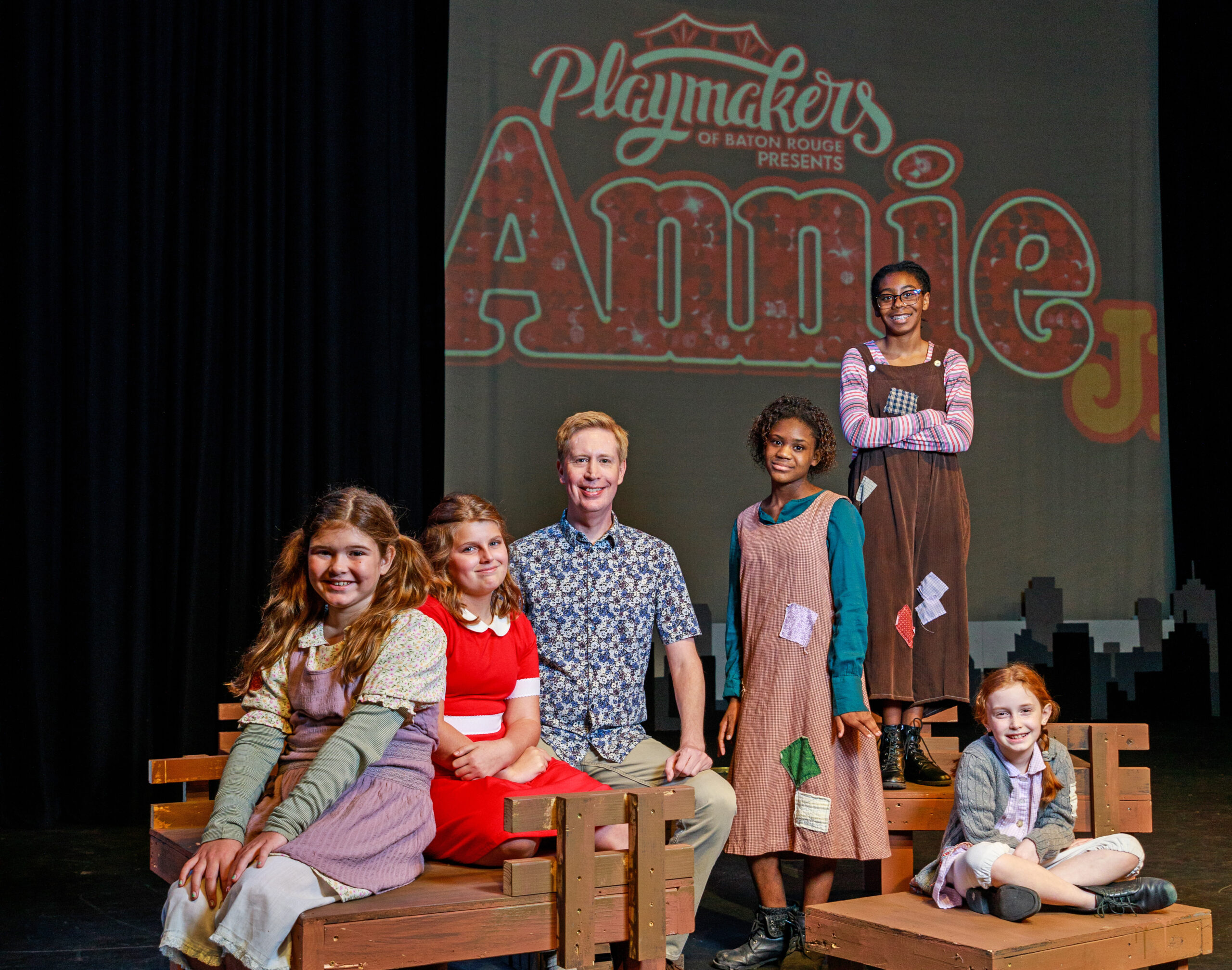The lights went down, the music piped up, and the audience sat, rapt. Depression-era orphans slammed down mop buckets in time, belting out a song about their hard-knock lives. Charming orphan Annie dreamed of finding her parents, while villainous Miss Hannigan mused of a world free of little girls. This was Annie Jr., Playmakers of Baton Rouge’s June musical, and the company’s first since the COVID-19 disruption.
Like every show Playmakers has performed since it opened four decades ago, young children were invited to come down from their seats and sit where the action is the most magical and immersive—on a square of carpet in front of the stage. During each of the company’s performances, the actors, comprised mostly of children and teens, aim to ensure that the kid spectators fall helplessly into the story, and perhaps even dream of being on stage themselves one day.
Indeed, some youngsters will be inspired to enroll in a Playmakers camp, or audition for a future show.
|
|
|
“When people ask me about Playmakers, it’s that carpet square right down in front,” says executive director Todd Henry. “That’s what we tell the actors before curtain. That’s who you’re doing the show for, those kids on the carpet.”
This month, Playmakers opens its 40th season as Baton Rouge’s premier professional theater company for young audiences.
The company, housed at LSU’s Reilly Theatre, stages three performances in the theater annually, and offers popular acting classes and summer camps where future Playmakers’ kid performers often get their start. Playmakers also creates and stages traveling shows for schools and public libraries.
The arts organization’s long history in Baton Rouge is a notable accomplishment, especially for a grassroots nonprofit that was launched by four theater students in the early ’80s. Friends and LSU School of Theatre graduate students Pabby Arnold, Charlotte Nordyke, Deborah Griffitts Hining and Sylvia Martinez had grown tired of the lack of professional companies in Baton Rouge where actors could be paid for their work, a common concern among burgeoning theater professionals trying to build their actors’ resumes, Arnold says.
Then, they had an idea.
“We had a visiting professor who told us to quit bellyaching and start something,” recalls Arnold, now an East Baton Rouge Parish librarian. “So we looked around to make sure we were starting something that didn’t already exist, and we found opportunity in a professional theater company for young audiences.”

With help from the Arts Council of Greater Baton Rouge, the group created a nonprofit and recruited actors from theater programs at LSU and Southern University. They opened their first season in 1982, staging shows in the Arts Council’s previous home in the old Bogan Fire Station on Laurel Street, where Playmakers would perform for many years. The inaugural season included the shows Two Pails of Water; Blackberry Dancing; Gris Gris Pie; and The Wind in the Willows, the story of four animal friends, Toad, Rat, Mole and Badger, living in the English countryside.
“We made sure that the scripts we chose were easy enough for children to understand, but also had enough subplot for adults to enjoy,” says Arnold, who ran the company for several years with Nordyke.
That first season, Arnold and Nordyke started what would become a Playmakers tradition. They asked local carpet companies to donate carpet sample squares that could serve as a seating option for kids. Scattered on the floor directly in front of the stage, the squares were an invitation for children down in front to express themselves spontaneously as the story unfolded.
A lot has happened since that first season, including years of sharing space with the Baton Rouge Little Theatre (now Theatre Baton Rouge), and moving for a time to the Manship Theatre. Throughout its history, though, Playmakers’ performances have always cast many children and teens. And as a professional theater company, it can hire adult actors. Most come from the LSU School of Theatre, one of Playmakers’ main partners.
This duality of bringing together kids with professional talent makes Playmakers a valuable arts asset, says Manship Theatre executive director Melanie Couvillon, who served as Playmakers’ executive director from 2005 to 2010 and performed in the company as a teen and young adult.
“It was professional in every sense of the word, so actors are learning all those important life lessons about working in the theater, like ‘being early is being on time,’” Couvillon says.
Along with its staged productions, acting classes and camps, Playmakers routinely hits the road with touring shows. Wally Wise Guy is its best known, a public service program featuring a turtle mascot named Wally Wise Guy, who uses silly dance steps to teach his friend Sammy Safeguard how to shelter in place during a chemical emergency. The shows are funded by ExxonMobil and other area chemical companies, and they typically reach more than 10,000 students a year, Henry says.
“In a regular year, we’re doing multiple shows a day,” Henry says. “Sammy does all the work, but the kids go crazy for Wally.”
Each year, hundreds of children take part in Playmakers’ classes and camps, which build confidence, communication skills and an appreciation for the arts, says Amanda Burge, Playmakers’ education coordinator.
“It’s important to us to make sure the kids in our camps are aware that they can come audition for a show,” says Burge, whose son, Logan, 17, has been acting in Playmakers’ productions for 10 years. Among other roles, Logan played James in James in the Giant Peach, and most recently, Rooster in Annie, Jr. He started acting in Playmakers’ shows after participating in one of its summer camps at age 7.
Logan, who plans to become a teacher, says being involved in Playmakers’ has yielded new friends and skills.
“For me, it’s helped with speaking, singing, dancing and being more open,” Logan says. “It’s helped me to communicate.”
|
|
|
This month, Playmakers kicks off its 40th season with a reboot of a popular show it staged five years ago, Junie B. Jones, The Musical. The cast includes many of the same young actors who performed in 2017, including Logan Burge reprising his role as Herb, and Evie Trahan, a regular Playmakers performer, starring again as Junie B. Jones. Casting teens to play children isn’t unusual for the company, which often blurs age lines between actors and the roles they play. At the end of the day, its goal is to put on a show that entertains families.
“It’s such a wonderful organization,” Couvillon says. “I can’t imagine Baton Rouge without it.” playmakersbr.org
This article was originally published in the August 2022 issue of 225 magazine.





